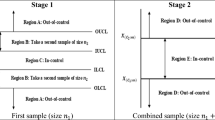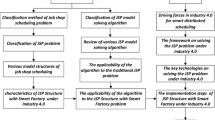Abstract
The design and reconfiguration of Material Handling Systems (MHSs) at the factory scale are known to be complex. Various design and reconfiguration alternatives have to be considered and evaluated through indicators such as: On Time Delivery (OTD) within the plant, number of material shortages or product waiting time, etc. Due to the dynamic behavior of MHS, simulation-based approaches play an essential role in such analysis. However, developing simulation models for MHS can be time-consuming (especially for modeling Large Scale Systems) and difficult to build (some skills and knowledge are required to use simulation software). To overcome these challenges, data-driven approaches have been proposed in the literature for the generation of MHS simulation models. Nevertheless, the available approaches focus on specific domains and may not always account for all the necessary data, including MHS control policies. Therefore, this paper aims to propose a framework that employs a data catalog regrouping five data categories (layout, product features, production process, material handling process, and MHS control methods) to support the generation of MHS simulation models using SIMIO. The article details the data structure used to gather MHS simulation data, the selection of a simulation tool, the modeling patterns integrated into the simulations, and the application of the transformation rules. The whole approach is implemented to form the generation framework. The framework is designed to assist decision-makers (who have basic simulation knowledge) in the evaluation of MHS design/reconfiguration alternatives. The paper finally presents a validation of the framework on two case studies.










Similar content being viewed by others
References
Alarie S, Gamache M (2002) Overview of solution strategies used in truck dispatching systems for open pit mines. Int J Surf Min Reclam Environ 16(1):59–76. https://doi.org/10.1076/ijsm.16.1.59.3408
Bandinelli R, Nunziatini A, Fani V, Bindi B (2022) A data-driven approach for process simulation optimization: a case study. In: Proceedings—European council for modelling and simulation, ECMS, pp 36–42. https://doi.org/10.7148/2022-0036
Beamon BM (1998) Performance, reliability, and performability of material handling systems. Int J Prod Res 36(2):377–393. https://doi.org/10.1080/002075498193796
Chaikovskaia M, Gayon JP, Marjollet M (2022) Sizing of a fleet of cooperative and reconfigurable robots for the transport of heterogeneous loads. In: 2022 IEEE 18th international conference on automation science and engineering (CASE), pp 2253–2258
Choe P, Tew JD, Tong S (2015) Effect of cognitive automation in a material handling system on manufacturing flexibility. Int J Prod Econ 170:891–899. https://doi.org/10.1016/j.ijpe.2015.01.018
Cronin C, Conway A, Walsh J (2019) State-of-the-art review of autonomous intelligent vehicles (AIV) technologies for the automotive and manufacturing industry. In: 30th Irish signals and systems conference, ISSC. https://doi.org/10.1109/ISSC.2019.8904920
Efthymiou OΚ, Ponis ST (2019) Current status of industry 4.0 in material handling automation and in-house logistics. Int J Ind Manuf Eng 13(10):1370–1374
El Abdellaoui ME, Bricard E, Grimaud F, Gianessi P, Delorme X (2020). Scalable, reconfigurable simulation models in industry 4.0-oriented enterprise modeling. In: Proceedings—winter simulation conference, pp 2755–2766. https://doi.org/10.1109/WSC48552.2020.9383973
Esmaeilian B, Behdad S, Wang B (2016) The evolution and future of manufacturing: a review. J Manuf Syst 39:79–100. https://doi.org/10.1016/j.jmsy.2016.03.001
Fragapane G, de Koster R, Sgarbossa F, Strandhagen JO (2021) Planning and control of autonomous mobile robots for intralogistics: literature review and research agenda. Eur J Oper Res 294(2):405–426. https://doi.org/10.1016/j.ejor.2021.01.019
Hao Q, Shen W (2008) Implementing a hybrid simulation model for a Kanban-based material handling system. Robot Comput-Integr Manuf 24(5):635–646. https://doi.org/10.1016/j.rcim.2007.09.012
Kim B, Jeong S, Shin J, Koo J, Chae J, Lee S (2009) A layout- and data-driven generic simulation model for semiconductor fabs. IEEE Trans Semicond Manuf 22(2):225–231
Lee KW, Chang DS, Park SC (2018) Material handling system modeling of a modern FAB. ACM Int Confer Proc Ser. https://doi.org/10.1145/3177457.3177490
Lugaresi G, Matta A (2020) Generation and tuning of discrete event simulation models for manufacturing applications. In: 2020 winter simulation conference (WSC). IEEE, pp 2707–2718
Lugaresi G, Matta A (2021) Automated manufacturing system discovery and digital twin generation. J Manuf Syst 59:51–66
Lugaresi G, Matta A (2023) Automated digital twin generation of manufacturing systems with complex material flows: graph model completion. Comput Ind 151:103977
MacGregor Smith J (2013) Queueing network models of material handling and transportation systems. In: Handbook of stochastic models and analysis of manufacturing system operations, pp 249–285.
Malik M (2018) Discrete event simulation of operating rooms using data-driven modeling. Doctoral dissertation, Ohio University
May MC, Kiefer L, Kuhnle A, Lanza G (2022) Ontology-based production simulation with ontologysim. Appl Sci (switzerland). https://doi.org/10.3390/app12031608
Meng C, Nageshwaraniyer SS, Maghsoudi A, Son YJ, Dessureault S (2013) Data-driven modeling and simulation framework for material handling systems in coal mines. Comput Ind Eng 64(3):766–779. https://doi.org/10.1016/j.cie.2012.12.017
Mestiri S, Jamil J, Fottner J (2021) A flexible and generic simulation model for in-bound transport systems. In: 20th international conference on modeling and applied simulation, MAS 2021, pp 85–90. https://doi.org/10.46354/i3m.2021.mas.011
Mestiri S, Fottner J (2022) Simulation-based dimensioning of internal transport systems. J Fact Econ 117:229–233
Musil M, Laskovsky V, Fialek P (2016) Analysis of logistic processes using the software tecnomatix plant simulation. In: 13th international conference on industrial logistics, ICIL 2016—conference proceedings, pp 195–200
Nunziatini A, Fani V, Bindi B, Bandinelli R, Tucci M (2022) Data-driven simulation for production balancing and optimization: a case study in the fashion luxury industry. In: Proceedings—winter simulation conference, pp 2957–2967. https://doi.org/10.1109/WSC57314.2022.10015439
Raman D, Nagalingam SV, Gurd BW, Lin GCI (2009) Quantity of material handling equipment—a queuing theory based approach. Robot Comput-Integr Manuf 25(2):348–357. https://doi.org/10.1016/j.rcim.2008.01.004
Reinhardt H, Weber M, Putz M (2019) A survey on automatic model generation for material flow simulation in discrete manufacturing. Procedia CIRP 81:121–126
Rodič B (2017) Industry 4.0 and the new simulation modelling paradigm. Organizacija 50(3):193–207. https://doi.org/10.1515/orga-2017-0017
Saputro TE, Masudin I, Rouyendegh BD (2015) A literature review on MHE selection problem: levels, contexts, and approaches. Int J Prod Res 53(17):5139–5152. https://doi.org/10.1080/00207543.2015.1005254
Singh N, Dang QV, Akcay A, Adan I, Martagan T (2022) A matheuristic for AGV scheduling with battery constraints. Eur J Oper Res 298(3):855–873. https://doi.org/10.1016/j.ejor.2021.08.008
Soufi Z, David P, Yahouni Z (2021) A methodology for the selection of material handling equipment in manufacturing systems. IFAC-PapersOnLine 54(1):122–127. https://doi.org/10.1016/j.ifacol.2021.08.193
Soufi Z, David P, Yahouni Z (2022) A reference data model for material flow analysis in the context of material handling system design and reconfiguration. In: IEEE international conference on industrial engineering and engineering management, pp 1488–1492. https://doi.org/10.1109/IEEM55944.2022.9989807
Soufi Z, David P, Yahouni Z (2023) Challenges of material handling system design in the context of industry 4.0. In: Service oriented, holonic and multi-agent manufacturing systems for industry of the future: proceedings of SOHOMA. Springer, Cham, pp 291–303
Stephens MP, Meyers FE (2013) Material handling. In: Manufacturing facilities design and material handling. Purdue University Press
Terkaj W, Urgo M (2014) Ontology-based modeling of production systems for design and performance evaluation. In: Proceedings—2014 12th IEEE international conference on industrial informatics, INDIN 2014, pp 748–753. https://doi.org/10.1109/INDIN.2014.6945606
Thiers G, Sprock T, McGinnis L, Graunke A, Christian M (2016) Automated production system simulations using commercial off-The-shelf simulation tools. In: Proceedings—winter simulation conference, pp 1036–1047. https://doi.org/10.1109/WSC.2016.7822163
Vieira A, Dias LS, Pereira GAB, Oliveira JA, Carvalho MS, Martins P (2015) Using simio to automatically create 3d warehouses and compare different storage strategies. FME Trans 43(4):335–343. https://doi.org/10.5937/fmet1504335V
Vieira A, Dias L, Pereira G, Oliveira J (2014) Comparison of simio and arena simulation tools. In: 12th annual industrial simulation conference, ISC 2014, pp 5–13
Vieira A, Dias LS, Pereira GB, Oliveira JA, Carvalho MS, Martins P (2016) Automatic simulation models generation of warehouses with milk runs and pickers. In: 28th European modeling and simulation symposium, EMSS 2016, vol 1, no 1, pp 231–241
Wang J, Chang Q, Xiao G, Wang N, Li S (2011) Data driven production modeling and simulation of complex automobile general assembly plant. Comput Ind 62(7):765–775. https://doi.org/10.1016/j.compind.2011.05.004
Wohlgemuth V, Page B, Kreutzer W (2006) Combining discrete event simulation and material flow analysis in a component-based approach to industrial environmental protection. Environ Model Softw 21(11):1607–1617. https://doi.org/10.1016/j.envsoft.2006.05.015
Wuennenberg M, Wegerich B, Fottner J (2022) Optimization of internal logistics using a combined bpmn and simulation approach. In: Proceedings—European council for modelling and simulation, ECMS, pp 13–19. https://doi.org/10.26034/lu.akwi.2022.3465
Acknowledgements
The authors thank the French National Research Agency (ANR) that funded this research under the LADTOP project (Grant ANR-19-CE10-0010-01) and The German Academic Exchange Service (DAAD) for the short term-research stay Grant (ID 57588366).
Author information
Authors and Affiliations
Corresponding author
Ethics declarations
Conflict of interest
The authors declare that they have no known competing financial interests or personal relationships that could have appeared to influence the work reported in this paper.
Ethical approval
This article does not contain any studies with human participants or animals performed by any of the authors.
Additional information
Publisher's Note
Springer Nature remains neutral with regard to jurisdictional claims in published maps and institutional affiliations.
Rights and permissions
Springer Nature or its licensor (e.g. a society or other partner) holds exclusive rights to this article under a publishing agreement with the author(s) or other rightsholder(s); author self-archiving of the accepted manuscript version of this article is solely governed by the terms of such publishing agreement and applicable law.
About this article
Cite this article
Soufi, Z., Mestiri, S., David, P. et al. A material handling system modeling framework: a data-driven approach for the generation of discrete-event simulation models. Flex Serv Manuf J (2024). https://doi.org/10.1007/s10696-024-09535-z
Accepted:
Published:
DOI: https://doi.org/10.1007/s10696-024-09535-z




